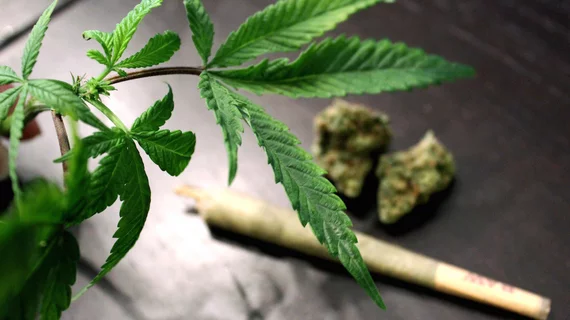Marijuana use linked to worse outcomes for PCI, heart attack patients
Marijuana use is associated with a greater risk of cardiovascular complications following percutaneous coronary intervention (PCI) procedures, according to new findings to be presented at the American Heart Association’s Scientific Sessions 2020 virtual meeting. A separate study, scheduled to be presented at the same meeting, found that acute myocardial infarction (AMI) patients who use marijuana may be more likely to have repeat AMIs.
“As marijuana is becoming more accessible across the U.S., there is a need for rigorous research to better understand the effects of marijuana use on cardiovascular health,” Sang Gune Yoo, MD, of the University of Michigan in Ann Arbor, said in a prepared statement from the AHA.
Yoo is the lead author of the PCI study, an analysis that tracked the outcomes of more than 113,000 patients from the state of Michigan who received treatment from January 2013 to October 2016.
Patients who smoked marijuana within a month of a PCI procedure had a much greater chance of bleeding events or a stroke after PCI, the researchers observed. The risk of death was unchanged, however.
In addition, marijuana use was associated with a lower risk of acute kidney injury.
“Although people who smoke marijuana may be at higher risk for complications such as stroke and post-PCI bleeding, this should not deter patients who use or have used marijuana from pursuing potentially life-saving PCI procedures,” Yoo added. “As marijuana use continues to increase, medical professionals and patients should be aware of these increased risks of complications after PCI. Physicians should screen and counsel patients about marijuana prior to their procedure due to the risks of serious complications.”
Investigating AMI trends
The researchers behind the second study focused on marijuana use among patients included in the National Inpatient Sample. Overall, marijuana use has skyrocketed among patients who survived an AMI or revascularization. And while 67% of patients who used marijuana had a repeat AMI, that number was 41% for patients who did not report marijuana use.
“There was an alarming rise in the trend of cannabis use among patients who have already had a heart attack or coronary revascularization procedure during the study period,” said lead author Rushik Bhuva, MD, a cardiology fellow with the Wright Center for Community Health in Scranton, Pennsylvania. “Another concerning finding was that the frequency of recurrent heart attacks and cardiac interventions was higher among cannabis users, even though they were younger and had fewer risk factors for heart disease.”
One limitation to that research, the authors noted, was that it was unclear whether marijuana use was recreational or medicinal in nature.
AHA Scientific Sessions 2020 is scheduled for Nov. 13-17, 2020. More information on this virtual event is available here.

